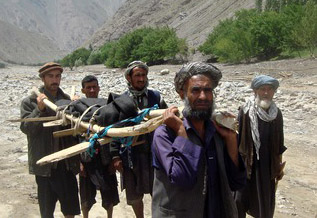By Hashmat Baktash
At least 80 people have been killed and more than 100 are missing in two days of severe flooding in northern Afghanistan, officials said Sunday.

Afghan villagers transport the body of a victim after a flashflood landslide in Baghlan province on 7 June 2014. (Photo: Zekria Nasirestr/AFP/Getty Images)
Families were searching desperately for loved ones amid the wreckage of waterlogged villages after flash floods that began Friday in Baghlan province swallowed up houses made of mud. About 5,000 families are homeless following the disaster, according to the provincial governor, Sultan Mohammad Ebadi.
Two Afghan army helicopters reached the hardest hit district, Guzargah-e-Nur, and distributed more than 100 tents, emergency food, drinking water and medicine, Ebadi said. But the district’s remote and mountainous location, about 100 miles north of the provincial capital of Pul-e-Khumri, was complicating relief efforts.
“The only two ground routes to the district are closed and we don’t have the machinery to clear out the roads,” Ebadi said by phone from the flood-hit area.
Officials pleaded for more help from the Afghan government as well as international donors. So far, no countries or aid agencies have pledged support, Ebadi said.
Spring rains often bring severe flooding in northern Afghanistan, but this year’s floods were particularly severe, officials said. The disaster follows a devastating mudslide in another northern province, Badakshan, where some 2,000 people were buried in their homes when a mountain collapsed following torrential rains in early May.
Baktash is a Times special correspondent.



